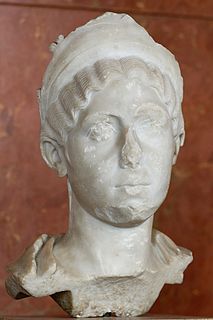 W
WHerennia Cupressenia Etruscilla was an Augusta and later regent of the Roman Empire, married to Emperor Decius, and mother of Emperors Herennius Etruscus and Hostilian. She served as regent of the Roman Empire during the reign of her son Hostilian in 251.
 W
WHimiko or Pimiko , also known as Shingi Waō , was a shamaness-queen of Yamatai-koku in Wakoku (倭国). Early Chinese dynastic histories chronicle tributary relations between Queen Himiko and the Cao Wei Kingdom (220–265), and record that the Yayoi period people chose her as ruler following decades of warfare among the kings of Wa. Early Japanese histories do not mention Himiko, but historians associate her with legendary figures such as Empress Consort Jingū, who was regent in roughly the same era as Himiko. Scholarly debates over the identity of Himiko and the location of her domain, Yamatai, have raged since the late Edo period, with opinions divided between northern Kyūshū or traditional Yamato province in present-day Kinki. The "Yamatai controversy," writes Keiji Imamura (1996:188), is "the greatest debate over the ancient history of Japan."
 W
WEmpress Jingū was a legendary Japanese empress who ruled as a regent following her husband's death in 200 AD. Both the Kojiki and the Nihon Shoki record events that took place during Jingū's alleged lifetime. Legends say that after seeking revenge on the people who murdered her husband, she then turned her attention to a "promised land". Jingū is thus considered to be a controversial monarch by historians in terms of her alleged invasion of the Korean Peninsula. This was in turn possibly used as justification for imperial expansion during the Meiji period. The records state that Jingū gave birth to a baby boy whom she named Homutawake three years after he was conceived by her late husband.
 W
WJulia Soaemias Bassiana was a Syrian noblewoman and the mother of Roman emperor Elagabalus, who ruled over the Roman Empire from 218 to 222. She was also de facto regent during her son's reign, with the support and companionship of her mother Julia Maesa. Both influential women effectively ruled Rome along with the young emperor until growing unrest and a family division led to her son replacement by her nephew Severus Alexander. Julia Soaemias was killed along with her son.
 W
WLady Triệu was a female warrior in 3rd century Vietnam who managed, for a time, to resist the Chinese state of Eastern Wu during its occupation of Vietnam. She is also called Triệu Thị Trinh, although her actual given name is unknown. She is quoted as saying, "I'd like to ride storms, kill sharks in the open sea, drive out the aggressors, reconquer the country, undo the ties of serfdom, and never bend my back to be the concubine of whatever man."
 W
WJulia Maesa was a member of the Severan dynasty of the Roman Empire who was the major power behind the throne in the reigns of her grandsons, Elagabalus and Severus Alexander, as Augusta of the Empire from 218 to her death. Born in Emesa, Syria, to an Arab family of priests of the deity Elagabalus, she was the daughter of Julius Bassianus and the elder sister of Roman empress Julia Domna.
 W
WJulia Avita Mamaea was a Syrian noble woman and a Roman regent of the Severan dynasty. She was the mother of Roman Emperor Alexander Severus and served as regent of Rome during his minority, de facto during his reign, first with the help and support of her mother Julia Maesa and then herself alone. She even in the last years of his reign, she retained power as a consors imperii, and continued to control his son's decisions as a co-ruler with Alexander. This was done in the past almost by her powerful aunt Julia Domna and was repeated by her. Mamaea herself next to her aunt, mother and sister, was the one of the few ancient Roman women in Roman history to equally share the power of running the entire empire with Roman Emperor legally and enjoyed equal honors with the emperor. She was killed in 235 by rebel soldiers along with her son.
 W
WUlpia Severina, also known as Severina, was a Roman Empress, the wife of the emperor Aurelian. There is evidence that she reigned in her own right for some period after Aurelian's death in 275, which would make her the only woman to have ruled over the entire classical Roman Empire by her own power. Very little is known about her, as there are no literary sources mentioning her existence. Almost everything known about her, including her name, is gathered from coins and inscriptions.
 W
WVictoria, also known as Vitruvia, was a leader in the Roman breakaway realm known as the Gallic Empire in the late 3rd century. She was the mother of Victorinus, who ruled as Gallic Emperor until his assassination in 271. Afterwards, Victoria used her authority to stabilize the empire and select a successor.
 W
WSeptimia Zenobia was a third-century queen of the Palmyrene Empire in Syria. Many legends surround her ancestry; she was probably not a commoner and she married the ruler of the city, Odaenathus. Her husband became king in 260, elevating Palmyra to supreme power in the Near East by defeating the Sassanians and stabilizing the Roman East. After Odaenathus' assassination, Zenobia became the regent of her son Vaballathus and held de facto power throughout his reign.